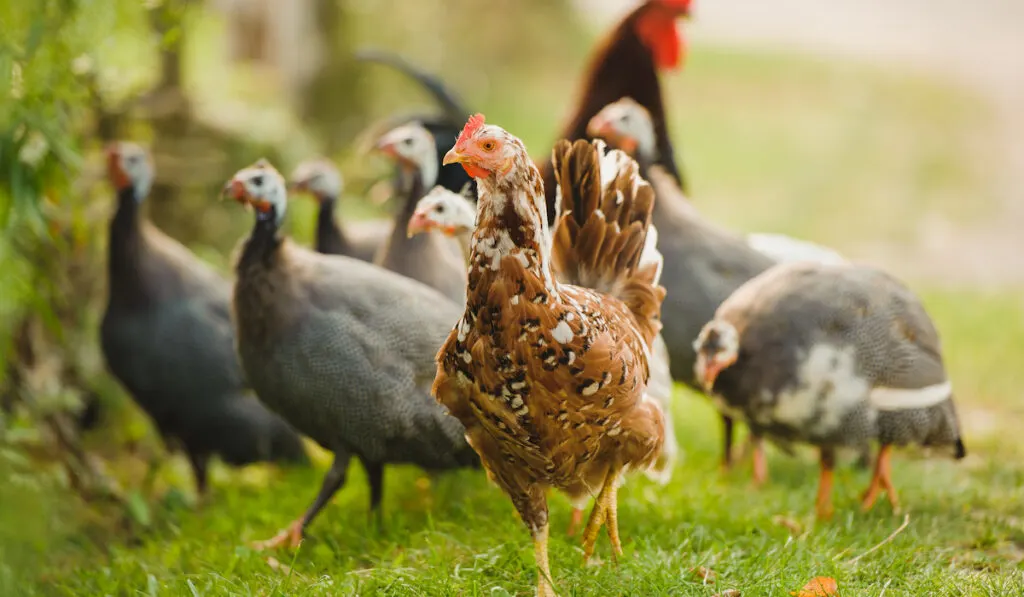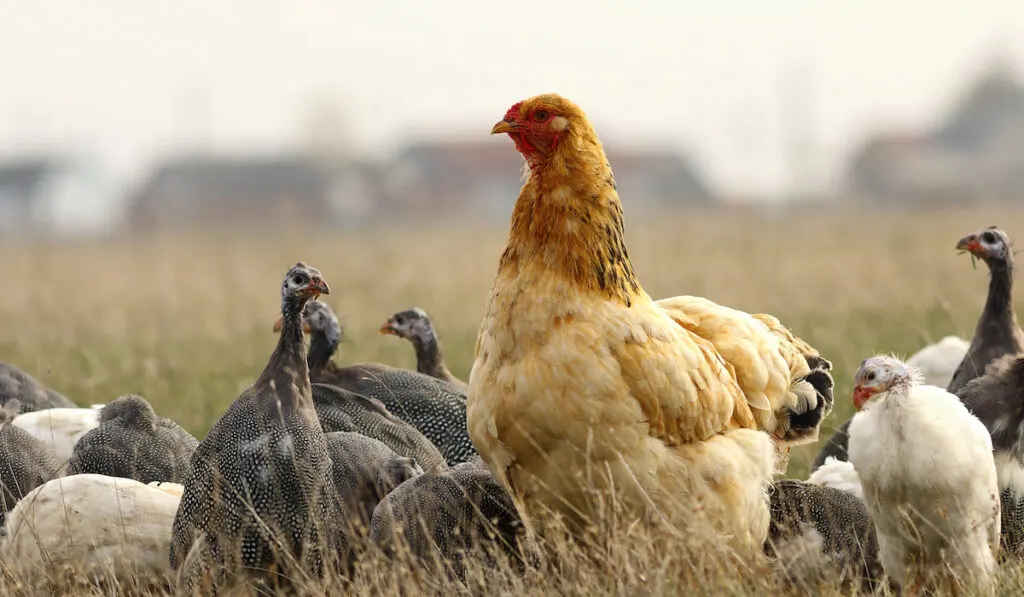Homesteaders always look for ways to reduce the cost of raising animals while maximizing their profit. One great way homesteaders maximize their profit is by raising different kinds of animals together.
For example, you can choose to raise chickens and guinea fowl. Can you raise chickens and guinea fowl together? What should you consider?
Can chickens and guinea fowl be kept together? Of course. As birds, chickens and guinea fowl have similar feeds and when raised well, you should not encounter any problem with both birds.

What are great tips to raise chickens and guinea fowl together? Is there any danger? Continue reading.
Raising Chickens and Guinea Fowl Together
It is not very difficult to raise both birds. Before you raise chickens and guinea fowl, you should have your reasons. What are some great reasons you should raise chickens and guinea fowl?
Some Reasons You Should Raise Chickens and Guinea Fowl
Here are great reasons to raise both kinds of birds together:
1. More Meat
The major reason people raise chickens and guinea fowl is for meat production. When you raise both chickens and guinea fowl, you get to enjoy a variety of bird meat. Chicken meat has a relatively lighter (or soft) texture when compared with guinea fowl meat.
2. More Eggs
Can you eat guinea fowl eggs? Of course, you can. Even though chickens and guinea fowl lay eggs, the way they lay their eggs is different. Chickens look for quiet and lonely places to lay their eggs. Some lay their eggs in the coop. Guinea fowl, however, look for spots in the field or close to a bush to lay their eggs.
When you choose to raise both chickens and guinea fowl, you get to enjoy a lot of eggs.
3. Pest Control
Did you know that birds like chickens and guinea fowl make great pest control against various pests? Some examples of pests that chickens and guinea fowl eat are:
- Ticks
- Mites
- Lice
- Soil nematodes
- Pinky mice
- Garden snails
- Slugs
When you allow your chickens and guinea fowl to search for food (i.e. free-range), you will find fewer pests around.
4. As Pets
Why would you want to keep a bird such as a guinea fowl as a pet? For chickens, it’s understandable and people do have chicken pets.
For guinea fowl, however, most people who love wild birds love having guinea fowl around. Some people keep guinea fowl as pets because they can fly.
One great thing about keeping bird pets is that they can give you eggs and are also great at controlling the population of pests in or around your home.
Make sure that local regulatory laws permit you to keep chicken or guinea fowl pets.
5. No Kitchen Scrap Waste
Chickens and guinea fowl can eat a lot of stuff including food waste. Some examples of food waste that they can eat are:
- Fruit peels
- Seeds
- Bread crumbs
- Leafy greens
- Microgreens
With chickens and guinea fowl around, you’re sure of not throwing any kitchen scraps away. Before you give a new kind of kitchen scrap to your birds, you should make sure that it is safe for them.

Can Both Birds Eat The Same Kind of Feed?
Both birds can eat the same kind of feed. Some examples of similar feeds that both birds can eat together are:
- Mealworms
- Grains
- Fruits
- Nuts
- Seeds
- Insects
- Leafy greens
As for processed feed, you should note that the crude protein requirement of guinea fowl is different from that of chickens. This means that if you must give processed feed to your birds, you should give them separate feed. You should give chicken feed (starter, grower, finisher, etc.) to your chickens and guinea fowl or wild game bird feed to your guinea fowl.
Later in this article, you will learn more about feeding your birds (when raising them together).
Useful Tips for Raising Chickens and Guinea Fowl Together
Want to raise chickens and guinea fowl together? Here are great tips for you:
1. Have Multiple Entrances
If their cage or coop has multiple entrances or exits, it’ll reduce the rate of contact between birds and can prevent them from fighting. Dominant males can pick on other birds when there is just one door and it can lead to your birds fighting.
Multiple entrances and exits can also help oppressed birds to easily escape.
2. Always Make Feed Available
One major reason your chickens and guinea fowl may fight is when there is a shortage of feed. Animals (not just birds) compete for food, so you should always make feed available to prevent them from fighting.
You should have multiple feeding and water troughs to prevent overcrowding and birds stepping on other birds.
3. Raise Fewer Males of Both Birds
Males usually fight other males for mates. Male birds can fight other male birds (of the same species) for food, mate, space, etc. Male birds will also fight the males of other bird species for dominance, food, water, etc.
To prevent your guinea fowl and chickens from fighting, you should keep fewer males in the same cage or coop.
4. Feed Both Birds Using Live or Natural Feed
Remember that the protein needs of chickens differ from that of guinea fowl. This means that if you spend too much on species-specific processed feeds, you may be wasting your feed when birds of the other species eat the feed.
For example, if the protein need of guinea keets is lower than that of chicks, but you feed your guinea keets with chick starter feed, you may be giving them too much protein, which can be considered a waste.
To prevent wasting feed and money, give your birds live feed and other feeds that are not species-specific. Note that your birds may not grow as quickly as birds that feed strictly on processed feed.
5. Make Compartments in Their Cage
If you are having trouble raising both birds with ease, make compartments in their cage and train your birds to return to their compartment. This means that chickens will have their own compartment while guinea fowl will have theirs.
It is not uncommon for some chickens to visit the guinea fowl compartment (and vice versa), but compartments will reduce the rate of contact between both birds.
Awesome tips, right?

Related Questions and Answers
Have any questions? Here are some answers:
1. Is Free-Ranging Safe For Your Chickens and Guinea Fowl?
Free-ranging is completely safe for both chickens and guinea fowl. While chickens can eat a variety of meals during free-range, guinea fowl can fly to farther areas and get even more meals.
Some examples of food items that chickens and guinea fowl can eat while free-ranging are:
- Insects
- Snails
- Slugs
- Earthworms
- Nematodes
- Frogs
- Toads
- Fruits
- Seeds
- Young leaves
Even though you can raise chickens and guinea fowl free-range, you should provide more feed for quicker growth.
2. How Do You Get Chickens to Return to Their Coop?
Chickens do not have any problem returning to their coop. When the sun goes down, chickens will willingly go back to their coop.
For chickens to identify a coop as “their coop”, however, you have to make sure that they stay in the place for 1-2 weeks at least before allowing them to free-range.
As a tip, you should reward chickens to return to the coop occasionally. You can reward them by giving them their favorite grains and other treats. This will encourage them to always return to their coop.
3. How Do You Get Guinea Fowl to Return to Their Coop?
Unlike chickens, guinea fowl can be stubborn to return to their coop. Guinea fowl can fly, so they might get lost or not want to return to their coop. You can get them to return to the coop by following the tips below:
- Just after brooding, introduce your young guinea fowl into the coop and keep them there for 2-3 weeks.
- Feed them regularly (make sure that feed is always available) with grains and their favorite feeds.
- After 2-3 weeks, you can allow them to free-range.
- In the evening (around 6 pm) take feed to their coop and feed the ones that have returned. Wait till they all return and feed them with their favorite treats.
- Redo the previous step regularly (2-3 times per week) for 3 weeks until they are used to the environment.
If you do not reward your guinea fowl with treats when they return (especially at the beginning phase of their free-ranging), they may not return but will live around the coop.
4. Do Chickens and Guinea Fowl Share Similar Diseases or Infections?
Chickens, guinea fowl, and other birds have similar diseases. Some examples of diseases that chickens and guinea fowl both share are:
- Avian influenza
- Newcastle disease
- Fowl pox
- Viral arthritis
- Coccidiosis
Note that guinea fowl are hardier than chickens, so they do not get infected as easily. If you see symptoms of any disease or infection, please contact your local vet while you isolate the infected bird.
5. Can or Will Guinea Fowl Kill Chickens?
Guinea fowl are stronger than chickens. Guinea fowl can kill chickens when they fight. It is common for chickens and guinea fowl to fight when there are a lot of males present.
To prevent your guinea fowl and chickens from fighting, reduce the number of males present and always give them enough food, space, light, and anything they can compete for.
Has your question been answered?
Final Thoughts
Chickens and guinea fowl are wonderful birds that you can raise together. Raising chickens and guinea fowl has a lot of advantages and it is easy when you follow the tips in this article. Remember to prevent your birds from fighting.
Resources
- https://pubmed.ncbi.nlm.nih.gov/1139347/
- https://www.poultryworld.net/Nutrition/Articles/2016/11/Understanding-protein-requirements-2914798W/
- https://insteading.com/blog/why-you-should-raise-guinea-fowls-with-your-chickens/
- https://www.thehappychickencoop.com/keeping-guinea-fowl-with-chickens/
- https://poultryowner.com/can-chickens-and-guinea-fowl-be-kept-together/

